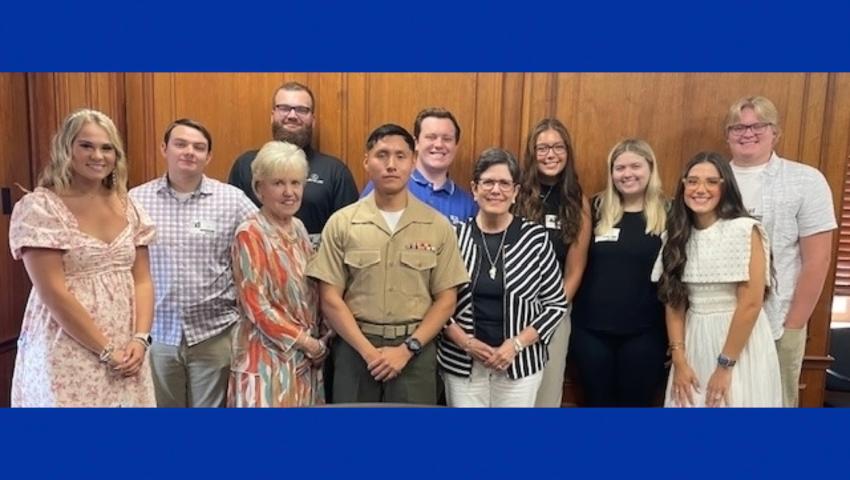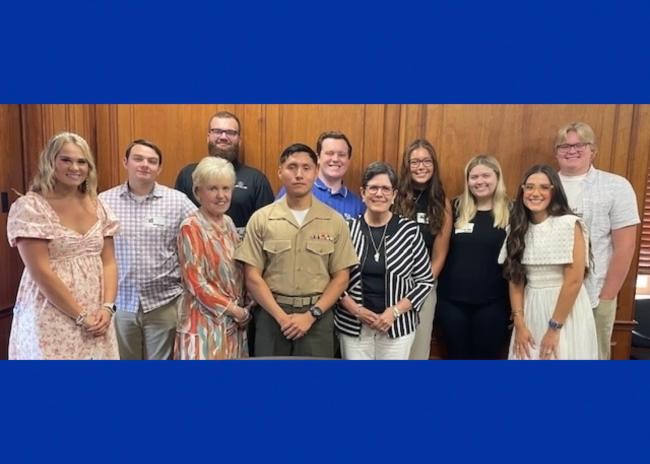
UK professor empowers future educators to integrate life lessons into curriculum
Mary Ann Vimont is committed to helping aspiring teachers weave essential life lessons into their curriculum.
As an associate professor in the University of Kentucky College of Education, Vimont encounters individuals expressing a desire for youth to gain a better understanding of how community issues and economics influence daily life, from managing personal finances to understanding the broader economic forces at play in society.
Seeing an opportunity to address this gap, Vimont designed a course to help aspiring teachers.
“Teachers have a great deal of curriculum to cover, so building these lessons into what they are already teaching helps them cover more ground,” Vimont said. “The course is open to any pre-service teacher. Regardless of the age group or subject they plan to teach, they all find ways to incorporate real-world lessons into their future classrooms.”
One such student, Garrett Kneisler, a Master of Arts in Secondary Education with Initial Certification (MIC) scholar, plans to teach high school social studies. He was inspired to go into education by the great teachers who impacted his life. From his own experience in school, he recognizes the need to integrate life skills into the curriculum.
“As a student, there really hasn’t been a course that has taught me how to make my money work for me and achieve financial freedom. I went into this class thinking I was not going to be able to teach economics. However, after the first day, I felt confident in my ability,” Kneisler said.
Similarly, MIC English scholar Micah Dalbey, who is preparing to become a high school English teacher, emphasized the importance of equipping students with the knowledge and confidence to navigate adulthood. At first, she found it challenging to incorporate economics into English lessons focused on reading and writing.
“I eventually figured out a few ways to do it. Building economics into the lessons was extremely helpful and a skill I will use throughout my career as an educator; it’s also something that will be of immeasurable value to students,” she said.
Vimont’s course, which is taught each summer in the College of Education, also taps into community issues. She brings in guest speakers to discuss topics and programs that future teachers may encounter in the communities where they will work.
This summer’s lineup included Gerald Gibson, founder of Operation Making a Change, who talked about the power of second chances, and Lexington Mayor Linda Gorton, who spoke to the students about issues facing Lexington and how their future classrooms could get involved.
“It is vital for teachers to be engaged within their local communities because it provides them with a blueprint of their students’ backgrounds, life-skills, and aspirations. Teachers are enabled to tailor an education best fit for their students and their abilities to succeed in and out of the classroom,” said UK MIC Social Studies scholar Stephen Douglass, who plans to become a high school social studies teacher.
Douglass aims to go beyond teaching a specific subject by connecting with students through his life experiences and community service.
“My Navajo heritage is one aspect of my life that I would gladly share with my future students as well as my service in the United States Marine Corps,” he said. “Both formulate my identity and motivation to not only better myself but also pass on knowledge.”
For Olivia Dale, a UK MIC Social Studies graduate student who discovered her passion for teaching while working as a teaching assistant during her master’s in history at UK, the class has been transformative. It taught her how to relate economic concepts to students through real-world and historical examples.
“I am now confident in my ability to help students understand the relevance of opportunity costs, externalities, and competition - a skill I did not have a month ago,” she said. “Above all, Mrs. Vimont was an encouragement to everyone in the class. This is the type of environment I want to create in my classroom one day and she is a great example to follow.”
Vimont, a former classroom teacher who joined the UK College of Education faculty in 1980, has been a long-time supporter of teachers. In 1998, she founded the annual Teachers Who Made a Difference program, supported by private donations and hosted by the college.
“Through the years, a common thread we have seen among nominations is that they always say, ‘this teacher believed in me, they supported me, and they made me think I could do it,’” Vimont said. “As a college that prepares teachers for their careers, we felt it would be fitting to create a platform for people to show their gratitude. From spending summers getting to know the students in the economics course, I have no doubt they will be among the teachers making a difference for their own students very soon.”

